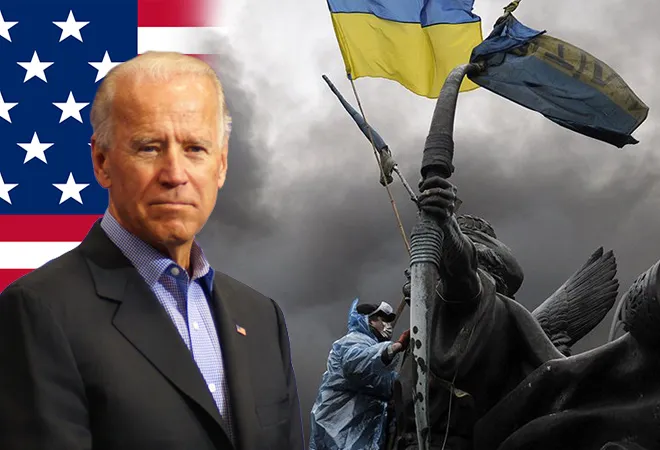-
CENTRES
Progammes & Centres
Location
The Ukraine crisis coupled with US’ domestic challenges is weighing down on the Biden administration
 This brief is a part of The Ukraine Crisis: Cause and Course of the Conflict.
This brief is a part of The Ukraine Crisis: Cause and Course of the Conflict.
The Ukrainian situation has caused the political sentiment in the US to be more united than before, for instance, in their appetite for lingered troop presence in Afghanistan or providing security to another country in the Middle East at the cost of American tax payers.Calls from various world leaders for sanctions against Russia has had its own interpretations and implications in Washington. Within the US, these divisions are acquiring various forms, ning from political derision to boycott of goods, services, and products. Utah Gov., Spencer J. Cox, issued an executive order asking the Utah Department of Alcoholic Beverage Control “to remove all Russian-produced and Russian-branded products from its shelves immediately.” In a similar move, Texas Governor, Greg Abbott, has asked restaurants, bars, and retailers to pull Russian products from their shelves. Senator Tom Cotton from Arkansas has echoed this sentiment. New Hampshire’s Governor, Chris Sununu, a Republican, announced a similar move. Some Democrats have also joined the boycott chorus. L. Louise Lucas, a top Democrat in the Virginia State Senate, is calling for “the removal of all Russian vodka and any other Russian products”. These sentiments ride on the gradual build-up of varied international reprisals against Russia at the business and government level. Canada’s Ontario, Manitoba New Brunswick, British Columbia, and Newfoundland have taken steps to ban Russian products from their stores. At the political level, The Ukrainian crisis may have revealed the political factionalism not just between the Democrats and Republicans but also within the Republican party in a better light. Even though some Republican states like Texas have backed a collective boycott of Russian products, the political right represented by the Trump faction within the Republican party have evinced a likeability for Putin as a person and his policies. The new political right in the US, riding on the Trump’s rhetoric since 2016, has come to see anti-democratic political systems and autocratic leaders in an ameliorated light. As such, in recent history, the American political right has been seen as fuelling culture wars and increasing divisions within the US with their changing world views. A recent poll found that 62 percent of Republicans and Independents from the GOP consider Putin as a ‘stronger leader’ than Biden. Trump himself has praised Putin as “savvy” which has divided the Republican party between Trump’s core supporters and the rest who want the GOP to go in a differing direction. However, the Democrats are now taking heart from the fact that although Trump leads the race in his party, ahead of the 2022 midterm elections and his likely bid for the 2024 elections, his popularity within the Republican party may be dwindling.
The rapid political and economic changes across the word, compounded by the pandemic, have limited America’s international forays and military interventions.The Biden administration’s response to the Ukrainian crisis is the second time in less than six months when it has belied the expectations of a traditionally strong response to global crises, starting with the Afghan fiasco in August 2021. The rapid political and economic changes across the word, compounded by the pandemic, have limited America’s international forays and military interventions. This has been attributed variously to relative decline of Washington, strain on its resources, and a dwindling political appetite for playing the global police. While these changes have been swift, the commensurate paring down of expectations from Washington may not have taken place yet—causing dissonance both in its domestic politics and international role. While a tendency to look inwards weighs heavy as a political strategy domestically—augmented by Trump’s ‘America First’—it comes at a huge cost of American power and influence abroad—realistic and perceptive. Some of these intricacies are reflected in the assessment of the current mood of the Americans, particularly in relation to the US’ response to the Russian invasion of Ukraine. A recent poll shows Americans’ faith in President Joe Biden's foreign policy has dropped during the Russia-Ukraine crisis. Only 36 percent of Americans approve of Biden’s handling of the Ukraine crisis and 55 percent disapproved. Worse still, his handling of the economy is at 37 percent, a considerable drop from 54 percent last year. This downward trend in the approval rating for Biden does not augur well for his prospects in the upcoming midterm elections. This is the second worst presidential approval ratings in US post polling history in 401 days of presidency. The Ukrainian crisis is amongst the latest set of factors impacting Biden’s political successes. The others being withdrawal from Afghanistan, Afghanistan crisis, rising inflation, and Democrats’ effort to pass sweeping voting rights legislation. Amongst the Republicans specifically, 86 percent of respondents disapproved of Biden’s response to the ongoing Russia-Ukraine crisis, while 53 percent of independents and 31 percent of Democrats felt the same.
Biden’s authorisation of US $600 million to Ukraine—US $350 million for procuring defence equipment and providing military training and education and an additional US $250 million to secure the interests of the United States has been widely acclaimed.Even as the Biden administration was caught in Supreme Court nominations and a deeply divided Congress over other domestic issues, the Ukrainian crisis forced an alternate course. After the Afghanistan fiasco, this is the second instance when Biden presidency’s political course has been redirected by a major foreign policy crisis which were out of its control. This turn of focus has also reflected in his State of the Union speech on 1 March. Finally, Biden’s challenges at home are beyond foreign policy. After facing intense pressure from governors over easing pandemic induced restrictions, Biden is still facing lingering ire. A truckers’ protest mimicking Canada’s People’s Convoy is headed for Washington D.C and is expected to reach on 5 March. Amongst their demands is to push for the end to the emergency powers that politicians in the US have used to enact pandemic-related restrictions. It will be interesting to see how Biden handles yet another mega international crisis with his domestic challenges.
The views expressed above belong to the author(s). ORF research and analyses now available on Telegram! Click here to access our curated content — blogs, longforms and interviews.

Vivek Mishra is Deputy Director – Strategic Studies Programme at the Observer Research Foundation. His work focuses on US foreign policy, domestic politics in the US, ...
Read More +